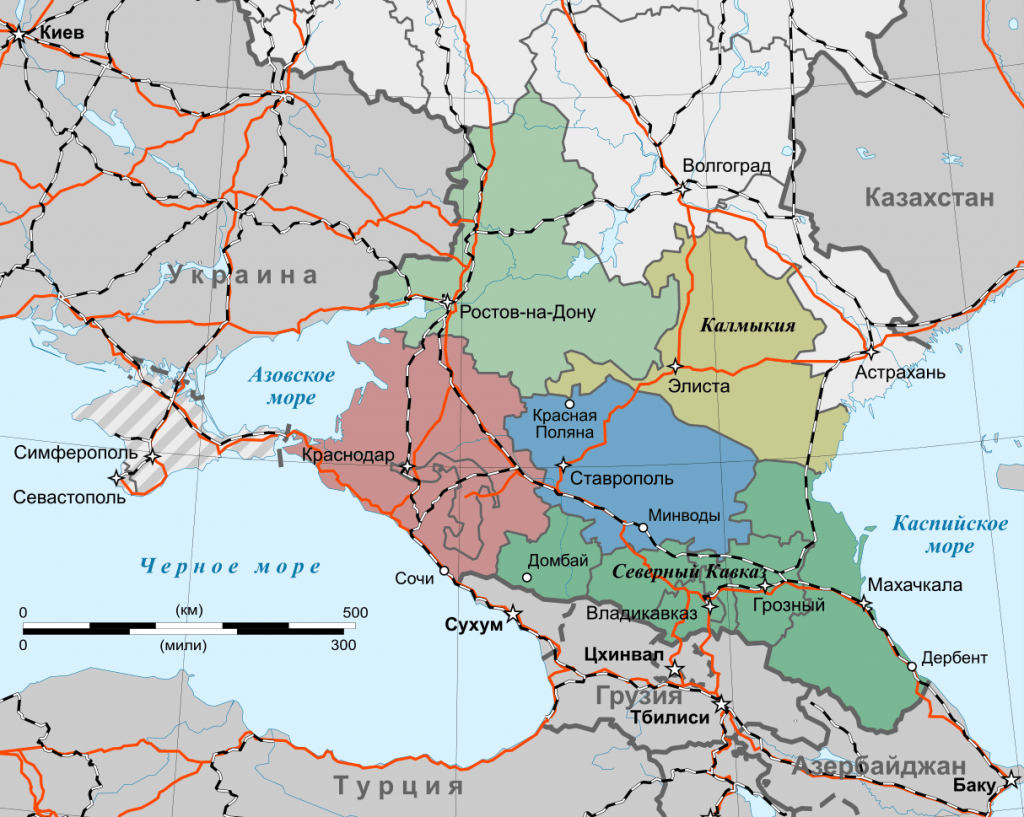
Geopolitical Report ISSN 2785-2598 Volume 2 Issue 1
Author: Giuliano Bifolchi
On January 22nd, 2020, Russian President Vladimir Putin abolished the Ministry of North Caucasus Affairs (Minkavkaz) established in 2014 to support regional development. The functions of the ministry will be transferred to the Ministry of Economic Development. The abolition of this ministry might be considered part of the political-institutional reshuffle which Putin started in the Russian Federation. This decision might be interpreted as the Kremlin’s will to change its approach to the North Caucasian dynamics.
The ministry, well-known as Minkavkaz (Ministersvo po Delam Severnogo Kavkaza), was established in May 2014 to link the Russian and the North Caucasian institutions and support the ‘Strategy for the Socio-economic development in the North Caucasus to 2025’ (from now on Strategy 2025). The North Caucasus is one of the most troublesome and depressed regions of the Russian Federation where the Kremlin has fought two wars in Chechnya (1994-1996 and 1999-2009) and faced problems related to ethnonationalism and religious radicalisation.
According to the Russian central authority, the North Caucasus’s main problems were the high unemployment level and lack of working specialisation among the young generations. Therefore, in 2010 the Kremlin decided to separate the North Caucasus from the rest of the Russian Federation, creating the Severo-Kavkazsky Federalny Okrug (North Caucasus Federal District, from now on NCFD) and launching Strategy 2025 to generate hundreds of thousands of jobs and positioning the region in the middle of the regional market.
On the one hand, Moscow has promoted significant financial investments to create regional tourism clusters known as Kurorti Severnogo Kavkaza (North Caucasus Resorts). On the other hand, the Kremlin has improved the presence of military forces, which have conducted special operations targetting the local terrorist group Imarat Kavkaz (Caucasus Emirate). Since 2010, Russian and local authorities have heavily contrasted the local militancy and terrorist groups achieving notorious successes as the killing of Doku Umarov, the leader of the Caucasus Emirate, and his associates.
In 2014, due to the fall of Imarat Kavkaz, several North Caucasian militants pledged allegiance to Abu Bakr al-Baghdadi, and the Islamic State confirmed the creation of Vilayat Kavkaz (Caucasus Province) as part of the caliphate. Although the Russian leadership has often underlined the socio-economic improvement in the North Caucasus and the increase in stability and security, the region has not been immune from terrorist and violent attacks and jihadist propaganda in the Russian language. Indeed, the Islamic State has claimed responsibility for the recent violent attack against a police traffic post that occurred on New Year’s Eve in Magas, the capital of the Republic of Ingushetia.
The Russian public opinion on the North Caucasus has often been negative because the region has been seen as the most challenging part of Russia and a ‘paradise’ for terrorist groups and political Islam. Perceived as the ‘inner abroad‘ because local customs and traditions significantly differ from the Russian one, the political opposition and some Russian parties have strongly criticised the Kremlin for having invested a considerable amount of money in the North Caucasus. The critics and the negative feelings toward the North Caucasus have nourished the Kavkazophobia (fear of the Caucasus) and the slogan ‘khvatit kormit’ Kavkaz‘ (stop feeding the Caucasus).
Widespread negative feelings toward the North Caucasus might be pushed the Kremlin to abolish Minkavkaz. This decision might create a further distance between the central authority and local institutions and boost the feeling of abandonment and estrangement, mainly among the North Caucasian people.
Even though the Kremlin (and in this case the president Putin) has always decided who should have been the head of Minkavkaz, a fact that underlines the impossibility for the local population to elect the regional political representatives, the Ministry of North Caucasus Affairs was an attempt to give centrality and importance to the region and fill the gap which in the past supported the affirmation of ethnonationalism movements and religious radicalisation.
Conclusion
With this decision, Vladimir Putin could have jeopardised the positive outcomes that the Russian government has achieved in the past years in a historical period characterised by the return of North Caucasian foreign fighters in their homeland whose result might be an increase of local militancy and diffusion of jihadist ideology which exploits local disappointment and young generations’ frustration.
Also, abolishing Minkavkaz might represent a transformation or change of the Kremlin’s strategy on the North Caucasian administration and local problems and the will to centralise the regional administration, decreasing the role of local politicians in financial funds’ management. An approach similar to what happened in the recent past when Crimea was included inside the Southern Federal District, lost its economic privileges and went under the management of the Krasnodar administration.
